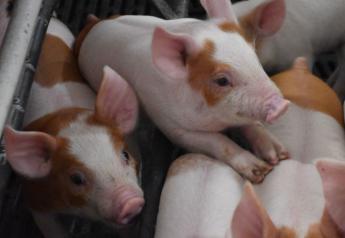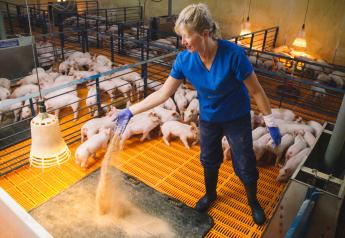Global Prices Bode Well for Increased Exports to China

Despite low domestic prices for pork, global prices are still attractive, and China is expected to import about three million tons of pork in 2017. This is similar to last year's level despite rising domestic production, a senior industry official said.
"Global prices are still attractive for importing pork into China," Juhui Huang, Shanghai-based vice president of Brazilian food conglomerate BRF SA said in an interview. "We expect pork imports will remain the same as last year at around 3 million tons."
China, which accounts for half of the world's pork consumption, has been rebuilding its herd of pigs following widespread culling in 2014 when prices were low.
Smithfield’s parent company, WH Group, will evaluate market conditions carefully before expanding pork processing operations in that country because of the over-capacity.
Chairman and CEO Wan Long said he expects pork prices to fall to an average of 14 yuan to 15 yuan ($4.20) per kilo this year after hitting a record high in 2016.
His comments come four years after WH Group bought U.S.-based Smithfield Food Inc., the world's biggest pork producer, for almost $5 billion, in a deal aimed at tapping the massive supplies of U.S. meat for export to China.
Pork demand has been impacted by a slowing economy, too. Consumption growth is expected to slow to less than 1 percent annually through 2020, according to Rabobank.
China has multi-year hog price cycles and seasonal fluctuations in pork demand associated with major holidays, said a USDA report on China’s pork industry. The ratio of the price of hogs to the price of corn, both measured in Yuan per kilogram, is used to measure the short-term profitability in hog production and to trigger government interventions, including a hog “price alert” market stabilization program introduced in 2009 to increase meat inventories to support market prices or release inventories to drive down consumer prices. A hog/corn ratio of 6:1 is considered “normal.” The national government is using a wide array of programs to encourage the development of hog farms, expand the breeding herd and control diseases.
Complementary Tastes
U.S. and Chinese consumers have tastes that are complementary and should increase trade, the report stated. The U.S. prefers muscle meat while Chinese consumers favor offal and variety meats. U.S. variety meats in 2011 sold at retail for less than half of Beijing variety meat prices, and tails, ears and kidneys have higher average prices in Beijing than spareribs.
The authors note that variety meats account for most of U.S. pork exports to China, but U.S. muscle meat is becoming more competitive.
The environmental impact of hog manure and risks of food safety incidents have received increased attention in recent years, and the authors theorize that environmental impacts and tight feed supplies may limit domestic Chinese pork production.
The authors concluded, “China’s status as a major pork importer will likely continue to grow. China’s tradition of self-sufficiency in pork will be hard to maintain as feed costs rise and as land for expanding farms and processing facilities becomes scarce and expensive.”
Exports are Critical
Steve Meyer, Vice President at EMI Analytics. agrees with the National Pork Board and NPPC that a major export disruption would be devastating to the industry. Mexico and Canada – two of U.S. pork’s biggest customers – are pivotal, so a “new and improved” NAFTA is a high priority. New bilateral agreements with other important trading partners in Asia and elsewhere are close behind in importance.
Besides the tumultuous political environment, the fear of a foreign animal disease is a real threat, and it difficult to even imagine the impact such an occurrence would have on livestock producers in the U.S.

Source: Steve Meyer, EMI Analytics
The National Pork Producers Council (NPPC) is requesting USDA’s Plant and Animal Inspection Service to “develop an adequate vaccine bank to address an outbreak in the U.S. for Foot and Mouth Disease.
“FMD presents a critical risk to the U.S. livestock industry,” NPPC said in an issue paper presented at the Pork Forum. “An outbreak of the foreign animal disease would cripple the entire agricultural sector and have long-lasting ramifications to the economic viability of U.S. livestock production. It is essential that USDA’s APHIS have a robust and timely response capability in the form of a rapidly deployable FMD vaccine bank.”







